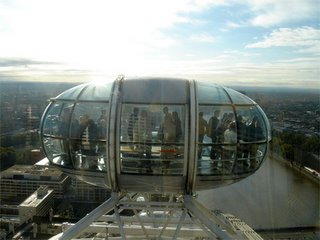 Perhaps it was the jet lag that left me in a state of wonderment. How did I end up 100 meters above London on a crisp fall day at the beginning of November?
Perhaps it was the jet lag that left me in a state of wonderment. How did I end up 100 meters above London on a crisp fall day at the beginning of November? Designed by architects David Marks and Julia Barfield, the London Eye was first opened in March 2000 as a vision for London of the 21st century. In that amount of time, it has become an elegant member of the Thames River skyline alongside Waterloo train station and facing the Parliament building.
I should say that I was more impressed than I expected to be, as I round the experience interesting and exhilirating. The Eye moves at an imperceptible speed, making the long arc in about 35 minutes. All the while, you are either rising or falling as the wheel turns, and the ride is smooth. Along the way, you get a birds-eye view of the city and get a chance to better place landmarks and monuments than the visually distorted (yet graphically brilliant) tube map would have you believe.
Eye above London, the jet lag melted away into the sunburst that greeted the zenith of our flight (British Airways sponsors the thing, naturally). I was happy to be in London, and I was happy to enjoy the view.
Comments